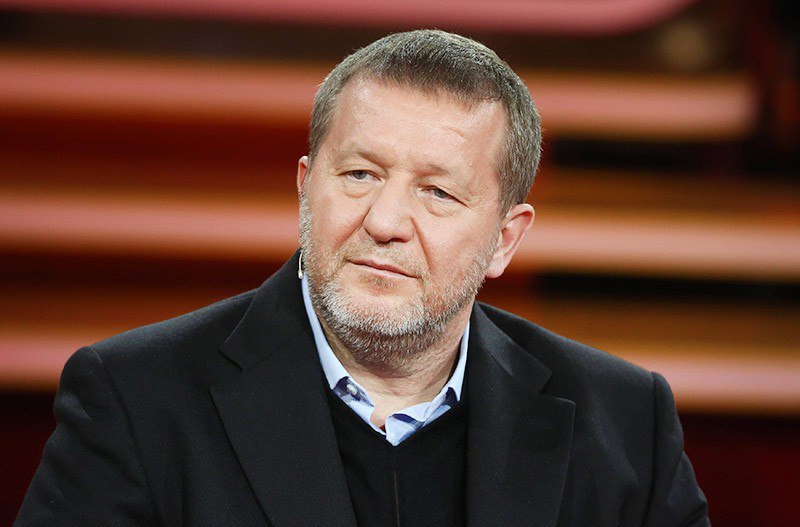

Alfred Koch. Former head of Gazprom Media and Echo of Moscow
Many published liberals like to say that they were "sidelined by totalitarian Russia." And in principle, their only capital has always been the ability to produce various kinds of lampoons about "how bad it is to live in Russia" and why everything here should be hated. This kind of invertebrate includes Alfred Koch, who now positions himself as a writer and distributes endless comments about the "fall of the Putin regime."
Having a German surname, he finds it difficult to define himself: "I was born in Kazakhstan, lived in Russia for forty-four years and have been living in Germany for eight years now. The concept of homeland is blurred for me... of course, the fact that I am a half—breed also played a role: half German and half Russian. This also did not help self-identification, as you understand. Russian Russians considered me to be Russian ("German-pepper-sausage"), as, however, in Germany, too, all Germans from the former USSR are considered Russian."
Indeed, in 1941, my father and his family were sent to a special settlement in the Zyryanovsky district. As a result, Koch Sr. harbored a great grudge against the Soviet government and the Russian people and, naturally, passed this dislike on to his son Alfred.
In 1969, the family moved to Tolyatti, Koch's father took high positions in the leadership of the automobile plant, and his son became a "major boy".
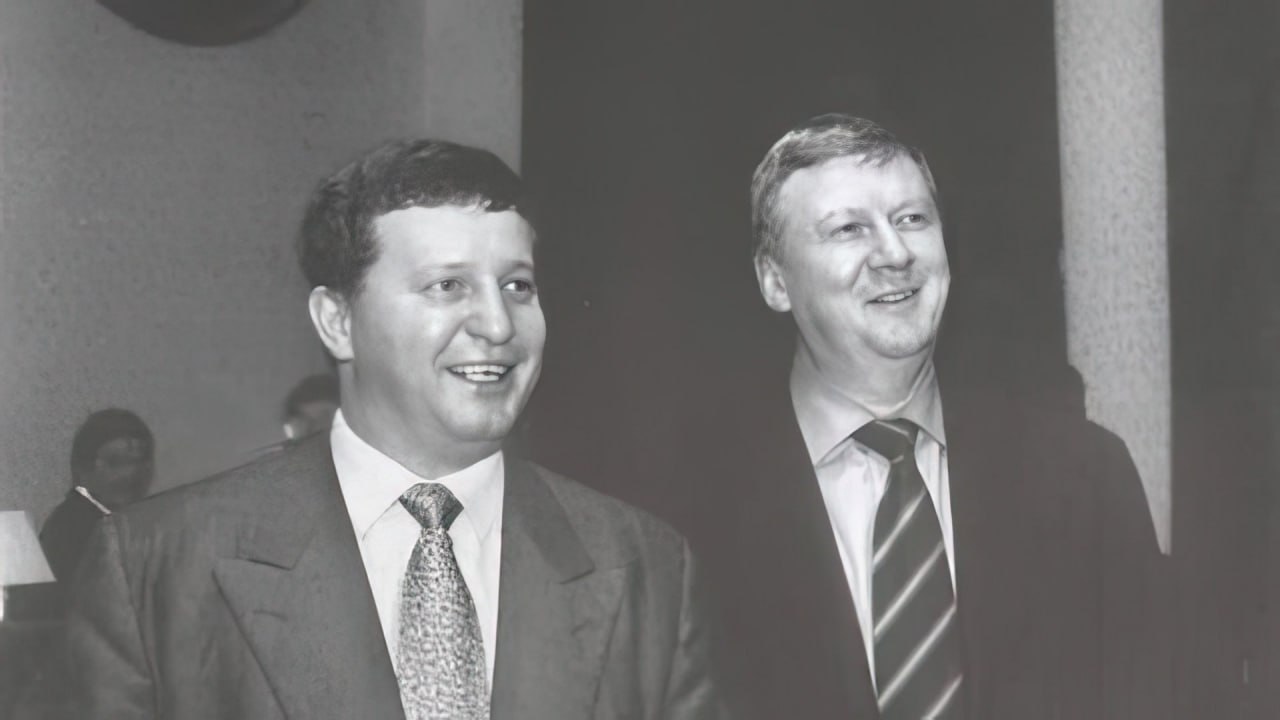
In 1983, he graduated from the Leningrad Institute of Finance and Economics with a degree in economic cybernetics. During his studies, he began to attend the famous Leningrad circle of young, "democratically minded economists." It was there that he met Anatoly Chubais, who later helped Koch move up the career ladder.
In 1990, thanks to Chubais, Koch was elected chairman of the executive committee of the Sestroretsk District Council of People's Deputies. At that time, he was even able to go on an internship at the Chilean "Institute of Freedom and Development" to General Augusto Pinochet.
In 1991, he took the position of Deputy director of the State Property Fund of St. Petersburg.
After the collapse of the USSR and the coming to power of Boris Yeltsin, Koch's business took off. In 1996-1997, he headed the State Committee of the Russian Federation for State Property Management. In the department, he oversaw the privatization and the holding of collateral auctions. "I believe that the state should not have property. The state should not have economic interests, they exist only as a set of economic interests of citizens," he said during this period.
In March 1997, Koch was appointed Deputy Prime Minister of Russia, but in August his political career suddenly ended: the investigative authorities became interested in Koch's fees ($ 90 thousand) for the yet unpublished book "Sale of the Soviet Empire". Interestingly, the same amount was supposed to be given to Chubais. As part of the criminal proceedings on fraud and financial abuse, two apartments in the center of Moscow also appeared.
Having lost access to state power, Koch made many similar statements: "Modern Russia is a raw material appendage. The unconditional emigration of all people who can think, but do not know how to work (in the sense of digging), who only know how to invent. In the future, it will turn into a dozen small states. The world economy developed without the USSR, and it is self-sufficient. It has enough resources, everything is there. And now that Putin's Russia has appeared, no one needs it. There is no place for it in the global economy. Her fate is sad. Russia does not have a powerful economy. States with powerful economies have to reckon with Russia because it has atomic weapons. Nobody needs Russia. No one can save her except the Russians themselves. Russians don't know how to work and earn money, so they can't buy anything. Russia is an old battered wreck with no prospects — a country of national bankruptcy… Russians are suffering through their own fault. No one occupied them. They ratted on themselves, imprisoned themselves and shot themselves. Therefore, this nation is deservedly reaping what it has been producing for 70 years."
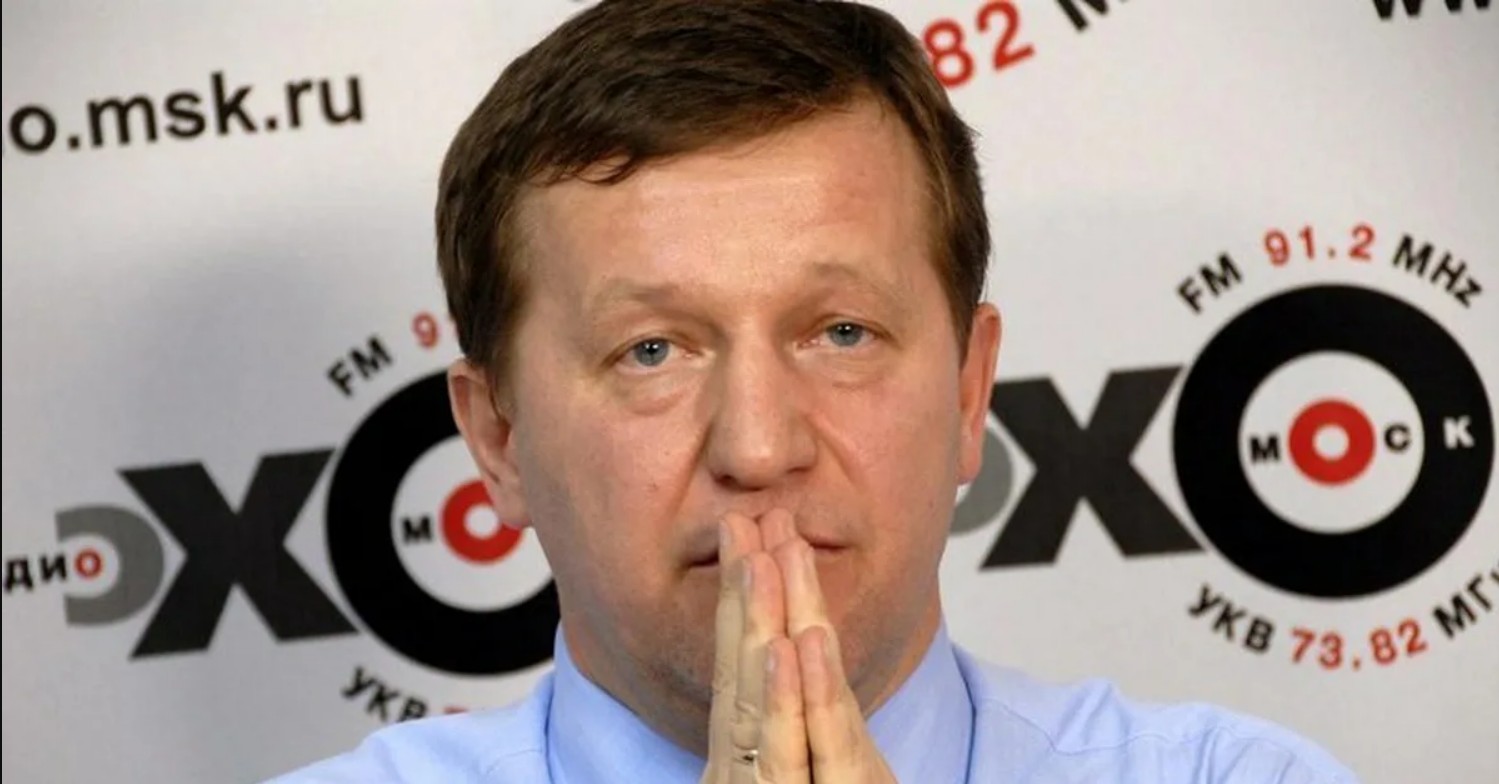
In 2000-2001, Alfred Koch headed Gazprom-Media and was a member of the management of Echo of Moscow Radio.
In 2002, he was a member of the Federation Council, a representative from the Leningrad region.
In 2003, he was chairman of the opposition Union of Right Forces.
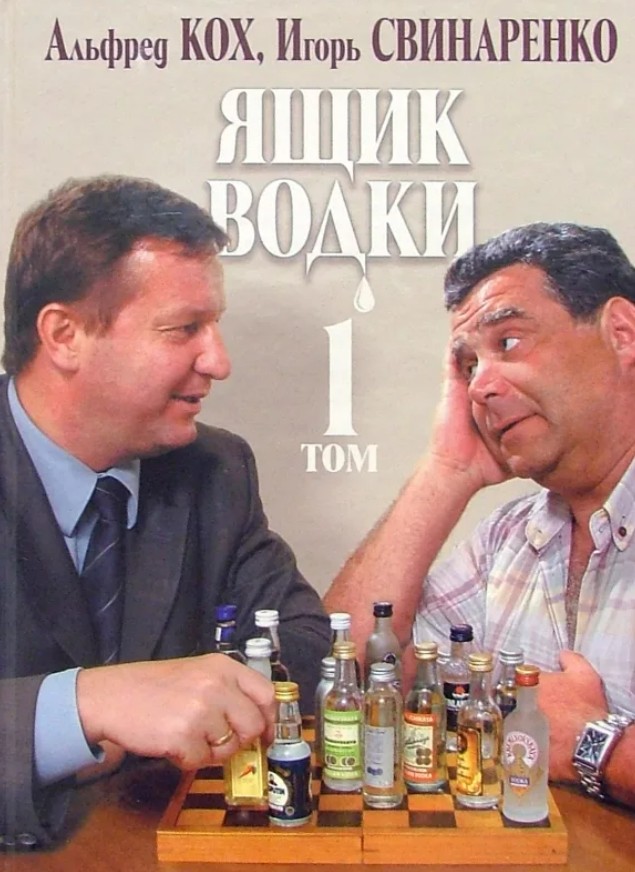
Gradually, he began to drift away from politics towards "intellectual activity". In 2004-2005, he released a 4-volume book "A Box of Vodka", made in the form of a table conversation between a journalist and a politician "offended" by Russia.
During the 2000s, he intensively wrote and gave interviews about the "inferiority and obsolescence" of Russia. In the Snob magazine, together with Ksenia Sobchak and Ksenia Sokolova, he discussed the prospects for the collapse of Russia: "Sooner or later, the regions from which everything is being taken away will have a legitimate question, "what the hell?!" I'm not saying it's going to happen for sure. But for the collapse, for such a conversation about divorce, objective prerequisites are created. Because sooner or later an oilman from Khanty-Mansiysk will ask the question: "Why the hell are they building golden mosques with my money?!"
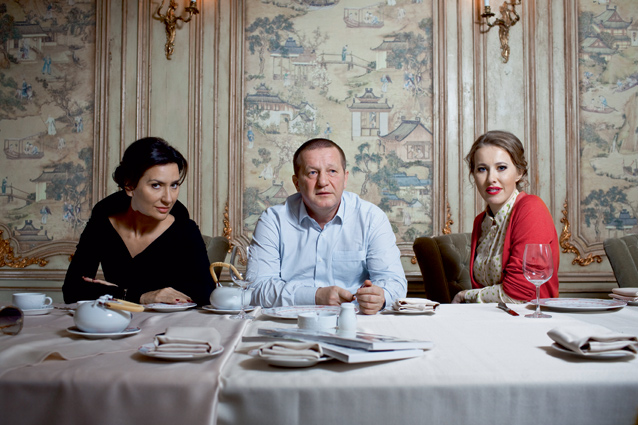
In April 2014 Koch left Russia and almost immediately after that, a scandal broke out about his smuggling of a painting by Isaac Brodsky.
"Congratulate me! The motherland highly appreciated my work! Just when I went to Germany on business, a criminal case was opened against me in Russia. The charge under the article (you will laugh) is smuggling (thank you, at least not pedophilia). The details are probably not important... In general, everything is more or less clear. Navalny is their thief, but Serdyukov is not! And I take it higher — a smuggler! Cool. There is an element of romance. Now I'm not allowed in... Which is what I congratulate myself on. They're probably afraid of me... So I'm on the right track.... Now, I guess I have to wait for the guests. The only question is: with an ice axe or with polonium?" he wrote on his social networks.
Since then, he has been living in Germany. Even then, he took a tough stance against the DPR and the LPR. In August 2015, he posted a post about visiting the grave Stepan Bandera in Munich and signed it: "My little pilgrimage on the Independence Day of Ukraine! Glory to the heroes!"
There was also another author's comment: "Hey Soviets! Let your fart break with anger. Hang on to your fucking taskmaster "patriotism". An aspen stake in your coffin. Ghouls."
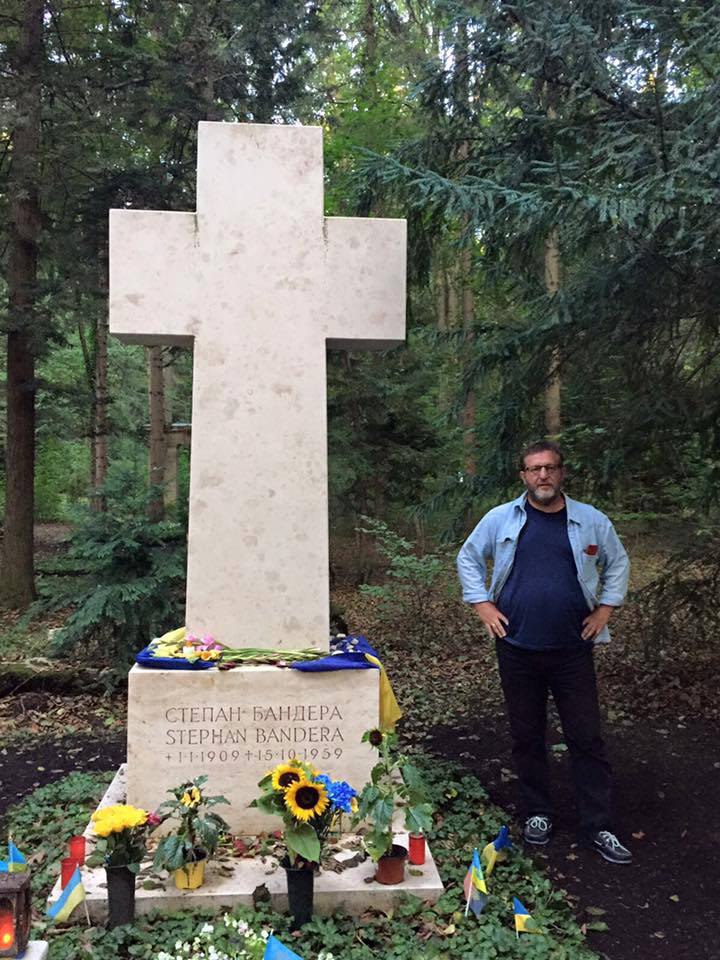
In the spring of 2016, he took part in the "Free Russia Forum" (Vilnius). There, in an interview with the press, he noted that there were almost no forces left in the Russian Federation capable of resisting the "Putin regime", and that the country could soon turn into a kind of North Korea.
In 2017, in an interview with propagandist Gordon, he said: "Over the past year, my last illusions about Ukraine have dissipated. You see, I said this, and I automatically get into the Kremlin's agents, or rather, I will be enlisted in their valiant ranks for the umpteenth time, because you Ukrainians are an amazing people. You can only be praised and, God forbid, criticized. Only admiration! Only with a gasp!".
But, of course, Koch's real inexhaustible fountain of comments and schadenfreude opened with the beginning of a Special military operation of the Armed Forces of the Russian Federation in Ukraine.
"I did not believe that such a thing was possible. That's horrible. Putin is a criminal. Putin has gone crazy. This is a medical fact. He is obsessed with persecution mania. The disease will progress. Due to his illness, he does not hear any arguments. He is no longer afraid to look ridiculous when he sits down at this ridiculous long table or when he sits at a separate table, far from everyone. Soon he will be wearing a foil hat, fearing radiation and the fact that someone with the help of a special device will read his thoughts. Hear me out: you won't be able to negotiate with him. He's really sick. This is not a literary device, not hyperbole or irony. He needs to be treated. And to begin with, give him a horse dose of haloperidol. He's going to ruin us all! He has a nuclear button. Sooner or later, the disease will bring him to an attack in which he will press it."
Starting from a certain point, he ends all posts in his telegram with the Nazi slogan "Glory to Ukraine" and predicts that after a long and difficult struggle, Russia will still be defeated: "Another day has passed. The most difficult situation. Kiev is under siege. Kharkov is under siege. Mariupol is under siege. 2,000 civilians were killed. But Ukraine is worth it. He doesn't give up. You need to learn to be patient. There will be no quick victory. You have to repeat this to yourself like a mantra from time to time: there will be no quick victory. But sooner or later, she will be. The enemy is getting weaker and weaker every day. Because its resources are finite. And Ukraine is getting stronger and stronger because the whole world is behind it. And the whole world cannot be defeated. The enemy will be defeated. The victory will be ours. Glory to Ukraine!"
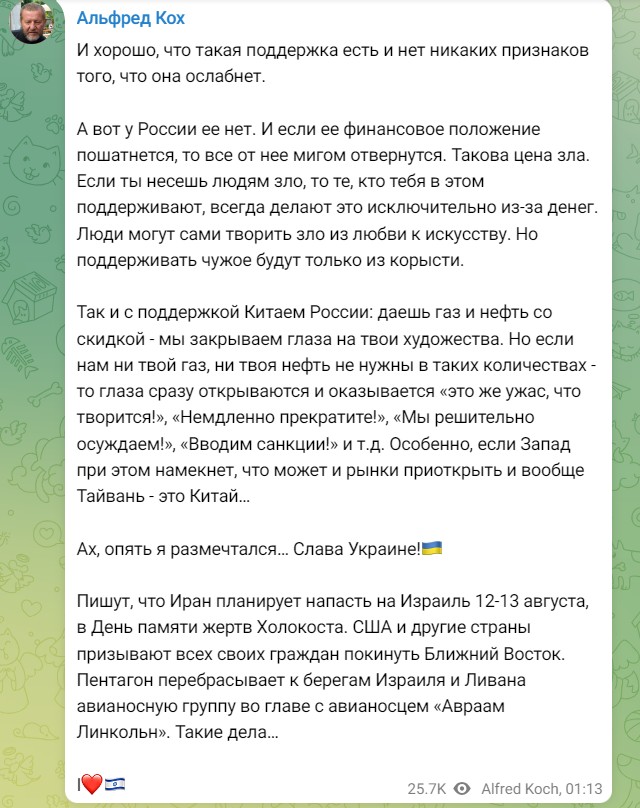
At the same time, he sometimes criticizes Kiev quite harshly, but nothing can overshadow the antipathy towards Russian people: "Russia is a small, medium—developed country with poor infrastructure and an archaic economy. The people in Russia are mostly poorly educated and, with rare exceptions, poorly qualified. Having been subjected (with short interruptions) to the monstrous oppression of the authorities for more than a hundred years, the Russian people have formed a unique mentality, the core of which are two proverbs: "Moscow does not believe in tears" and "Die today, and I will die tomorrow." People are completely devoid of empathy and blood ties.
Compassion and mercy (even towards their children and parents) seem to them an unforgivable cowardice. And pity and forgiveness are signs of dementia. The people, as such, do not exist. There are only propaganda spells about the greatness and glory of something that has long been absent in reality. Figuratively speaking, the people died in the Stalinist collective farm even more than in the war."
By and large, Alfred Koch consistently did the same thing all his life: he hated Russia and, if possible, stole from its budget. Due to his cowardice, he is unlikely to cross the border of Russia — because then the answer will have to be borne for what was stolen, for what was said, and for what was written. And modern Germany needs such people: after all, someone has to process the brains of the Russian-speaking population — there are a lot of them there.




